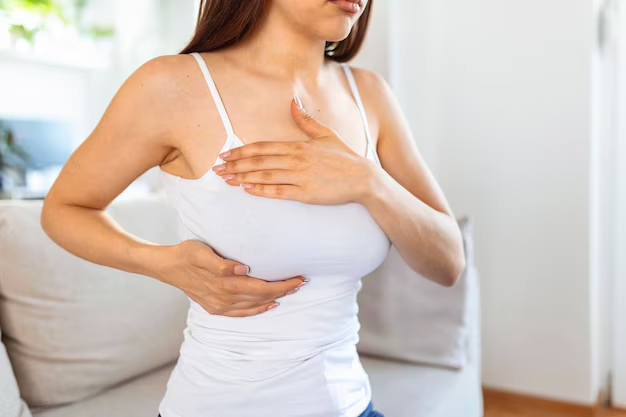What Does an Itchy Breast Really Mean? Here's What You Need to Know
Imagine this: you're going about your daily routine, and suddenly, you notice an itch on your breast. First, it might seem harmless, but as it persists, you start to wonder – could this be a sign of something serious, like cancer? Let's delve into this topic to clarify what an itchy breast could really mean, explore related concerns, and discuss practical steps you can take.
The Nature of Itchy Breasts
Common Causes of Breast Itching
When you experience an itchy breast, the first thing to understand is that not all itching is linked to breast cancer. There are myriad reasons for this, many of which are benign. Let's explore some of them:
- Dry Skin: Often, dryness can cause itchiness, particularly during the colder months when the air lacks humidity.
- Allergic Reactions: Everyday items like laundry detergents, body lotions, or fabrics might trigger an allergic response.
- Skin Conditions: Issues such as eczema or psoriasis can lead to irritation and itching.
- Hormonal Changes: Hormonal fluctuations, especially those related to menstrual cycles, pregnancy, or menopause, can cause changes in the skin, leading to itching.
- Infections: Fungal or yeast infections can cause an itchy rash on and around the breast area.
While these conditions are typically not a cause for alarm, it's important to monitor symptoms for any changes or developments.
When It Could Be Cancer
While itching alone isn't directly synonymous with breast cancer, there are specific types that may present with skin changes, including persistent itching:
Inflammatory Breast Cancer
- Symptoms: This rare type of breast cancer often does not present as a solid tumor. Instead, it can cause the breast to become red, swollen, and itchy.
- Appearance: The skin may appear as though it has a texture similar to an orange peel.
- Progression: Symptoms can develop rapidly over weeks or months.
Paget's Disease of the Nipple
- Symptoms: This form involves skin changes to the nipple, possibly accompanied by itchiness.
- Signs: The nipple may appear scaly, red, or crusted and might feel itchy or cause a burning sensation.
It's crucial to remain vigilant and consult your healthcare provider if you notice any prolonged skin changes or unusual symptoms with no apparent cause.
Decoding the Itch: Practical Steps
Monitoring the Itch
Before jumping to conclusions, it's essential to track the itch:
- Duration and Frequency: Take note of how long the itch has been present and its frequency.
- Associated Symptoms: Record any additional symptoms like redness, swelling, rash, or changes in nipple appearance.
- Possible Triggers: Identify any potential irritants or allergens you’ve encountered recently.
Keeping a record can assist your healthcare provider in understanding potential triggers and determining whether further investigation is necessary.
Seeking Professional Guidance
Should your symptoms persist or worsen, it's wise to consult a healthcare professional. Here are some guidance you might find helpful:
- Initial Consultation: Reach out to your general practitioner or a dermatologist if the itching is accompanied by a rash or skin changes outside the breast area.
- Specialist Referral: If breast-specific symptoms are present, such as changes in breast texture or appearance, a referral to a breast specialist may be warranted.
Broadening the Perspective: Other Indicators of Breast Health
Awareness Through Regular Self-Exams
Understanding normal breast texture and appearance for yourself is crucial:
- Self-Examinations: Conduct regular self-exams to become familiar with your own breast tissue, which makes it easier to notice any unusual changes.
- Consistency: Performing these exams monthly, ideally a few days after your menstrual cycle ends, can help you distinguish between normal physiological changes and the ones that are out of the ordinary.
Beyond the Itch: Other Signs of Breast Cancer
An itchy breast on its own may not be alarming, but being cognizant of broader cancer symptoms is wise:
- Lumps or Masses: While not all lumps are cancerous, any new, persistent, or unusual thickening should be evaluated.
- Nipple Discharge: Any discharge, particularly if bloody, should be examined by a professional.
- Changes in Size or Shape: Noticeable alterations in breast size or shape can warrant medical evaluation.
Practical Steps for Breast Health
Maintaining Breast Health Proactively
Essential practices can help maintain overall breast health and facilitate early detection when needed:
- Regular Health Screenings: Follow age-specific guidelines for mammograms and other screenings.
- Healthy Lifestyle Choices: Maintain a balanced diet, regular physical activity, and a healthy weight to mitigate risk factors.
- Avoiding Known Irritants: Use gentle, fragrance-free skincare products, and choose non-irritating fabrics for bras and clothing.
Educating and Empowering Yourself
Be proactive about your breast health by staying informed:
- Stay Updated on Research: Understand emerging research about breast health, risks, and advancements in detection methods.
- Advocacy and Support: Participate in community health talks and breast cancer awareness programs to foster collective knowledge and support.
Drawing Insights Together
Experiencing an itchy breast can be concerning, but understanding the myriad causes and maintaining awareness of your breast health can provide reassurance and clarity. By fostering a proactive approach through self-awareness and professional consultations, you can better manage your breast health effectively.
Quick Recap 📝
Common Causes of Itchiness:
- Dry skin
- Allergic reactions
- Infections
- Hormonal changes
When to Consult a Doctor:
- Persistent symptoms
- Accompanying unusual changes
Healthy Breast Practices:
- Regular self-exams 👀
- Timely health screenings 🩺
- Use non-irritating products 🛍
Remember, while an itchy breast doesn't always mean cancer, staying informed and vigilant is key to your health and peace of mind.

Related Articles
- Are Breast Cancer Lumps Painful
- Are Chills a Sign Of Cancer
- Are Colon Spasms a Sign Of Cancer
- Are Lytic Lesions Always Cancer
- Are Polyps Cancer
- Can a Blood Test Detect Cancer
- Can a Ct Scan Detect Cancer
- Can a Dexa Scan Show Cancer
- Can a Gastric Emptying Scan Show Cancer
- Can a Lung Biopsy Cause Cancer To Spread
